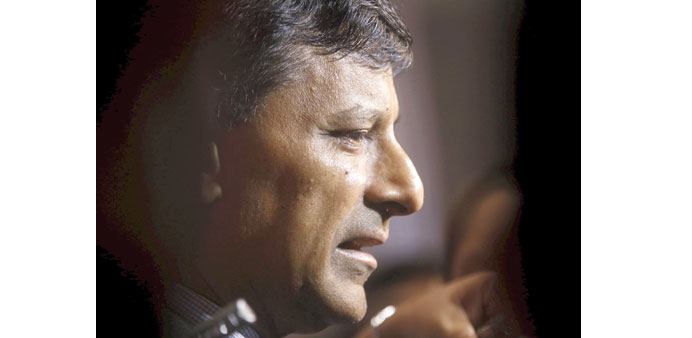Rajan: To focus on working with Modi’s government to eliminate any excuses banks give for keeping rates high.
Bloomberg
New Delhi
Now that India’s central bank governor Raghuram Rajan responded to government pressure with biggest rate cut since 2009, it’s Prime Minister Narendra Modi’s turn to act.
India’s lenders have been slow to pass on rate cuts earlier this year, prompting Rajan to say he’ll focus on working with Modi’s government to eliminate any excuses banks give for keeping rates high.
Among the key gripes are government-backed savings programmes that provide a better return for about 20% of the nation’s 1.2bn citizens. The most popular investments under these arrangements pay 8.7%, compared with 7.5% on deposits at India’s largest bank.
After Rajan surprised economists with a steeper-than-expected rate cut on Tuesday, Finance Minister Arun Jaitley and his aides told reporters they would review those small savings programmes to encourage greater transmission of rates. He wouldn’t give a timeframe for coming to a decision.
Tycoon Anand Mahindra, chairman of Mahindra Group, praised Rajan for delivering the “right medicine” while warning of a showdown on the government programme.
“Banks need to lower their cost of deposits and standing in the way are rates on public small savings schemes,” he wrote on Twitter. “Tricky issue for the government.” On the surface, it looks easy. Indians invested a net $6.5bn in small savings programmes in the year through March 2014, according to a government document seen by Bloomberg News.
That’s less than 1% of the $1.2tn poured into commercial bank deposits.
Yet changing the rates carries political risks in a nation where the majority of the population lacks social security and lives on less than $2 a day. The programme had at least 283mn users in the last fiscal year – about a fifth of the population.
Another problem is that funds from small savings also flow into the government’s coffers. Jaitley has budgeted revenue of $3.4bn from small savings programmes for the current year, and any reduction would make it tougher to meet his goal of narrowing the budget deficit.
“Small savings schemes will be reviewed,” Shaktikanta Das, economic affairs secretary, wrote on Twitter on Tuesday.
“Interest of small savers will be kept in mind.” Small savings include cash deposited at post offices, which dot the nation including in areas where there may be no bank branches. There are special incentives for vulnerable sections of the population such as pensioners and girls, and the returns are often exempted from tax.
‘No Chance’ There’s “no chance” that the government will revise small savings rates and there’s very little else policy makers can do to boost transmission, said Sunil Sinha, principal economist at India Ratings and Research Pvt., the local unit of Fitch Ratings.
While the monetary authority “can goad banks or show its displeasure,” commercial lenders need to balance economic necessities with their own profitability, he said. India’s banks are still struggling to shed bad debt. Modi’s $3.1bn recapitalization plan for state-run lenders announced in August didn’t provide any specific plan to address stressed assets. Loans are growing near the slowest pace since 1994 as Indian banks remain reluctant to pass on lower financing costs.
Before the decision, Rajan said that the median base lending rates of banks have fallen by only about 30 basis points this year. Following the move, the benchmark has now fallen by 125 basis points this year.
State Bank of India, the nation’s largest, dropped its base rate by 40 basis points immediately after Tuesday’s decision. Even so, chairperson Arundhati Bhattacharya told Bloomberg TV India that it’s too early to say how much more they’d cut.
The government’s decision to review the small savings programmes is a “good step in the right direction,” Aditya Puri, managing director at HDFC Bank told reporters on Tuesday.
He wouldn’t say how much he’ll reduce the base rate.
The government needs to clearly explain the economic rationale to the public to avoid protests, according to Mohan Guruswamy, chairman of the Centre for Policy Alternatives in New Delhi and a former finance ministry official.

